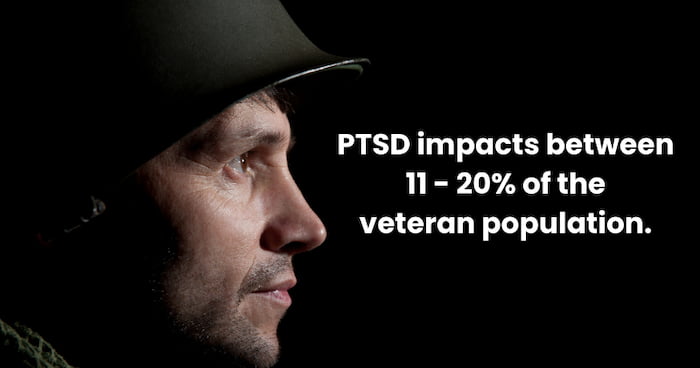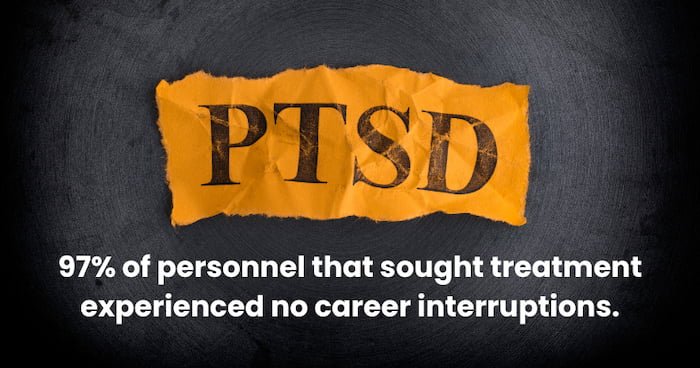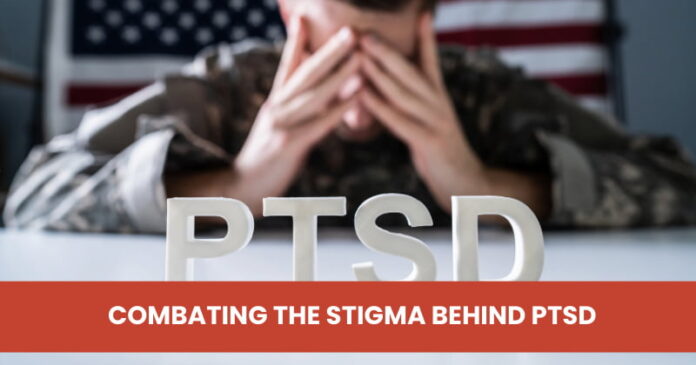PTSD and mental health issues in veterans are severely underreported. Why? Stigma. Dealing with PTSD and mental health issues is a profoundly personal and scary experience. Those who have experience with this often feel isolated and alone. These feelings contribute to the stigma surrounding mental health.
For years, these disorders have been misunderstood, mischaracterized, and the behavior of people with PTSD and mental health disorders is often misinterpreted. In recent years, the mental health and veteran communities have developed a strong partnership to break down barriers and reduce stigma.
This article will discuss the signs and symptoms of PTSD, the stigma surrounding PTSD and mental health in veterans, the efforts being taken to reduce stigma in the veteran community, and how you can help.

What is PTSD?
PTSD, otherwise known as Post Traumatic Stress Disorder, can develop due to exposure to a traumatic event. It presently impacts between 11-20% of the veteran population. Undiagnosed and untreated, PTSD can last months, if not years. Symptoms of PTSD and other mental health disorders can manifest in various ways. Some of the most common include:
● Intrusive Memories
● Avoidance
● Negative mood swings
● Physical or emotional detachment
● Suicidal thoughts or ideations
In addition to symptoms manifesting in multiple ways, PTSD and other mental health disorders can take weeks or months to manifest after witnessing a traumatic event. PTSD and mental health disorders are not one-size-fits-all.
If you or someone you know has witnessed a traumatic event, it’s important to keep an eye out for any symptoms so you can seek the help you need or encourage your loved one to seek the help they need to get better. PTSD and many other mental health disorders that result from service are treatable!
The Stigma Surrounding Veterans with PTSD and Mental Health Disorders
The stigma surrounding PTSD and mental health issues is one of the contributing factors to veteran suicide. Stigma is a mark or characteristic of disgrace associated with a particular circumstance, quality, or person.
Those suffering or confined by stigma can suffer from stereotyping, bullying, harassment, isolation, discrimination, and limited access to employment and community-centric activities.
Specifically, in the military, where strength, toughness, and mental clarity are revered. It can be scary to seek treatment and help for PTSD and mental health disorders that are seen as “weak” or “dangerous.” Many veterans face something called self-stigma rather than community-induced stigma.
Self-stigma occurs when an individual holds demeaning or degrading beliefs about a particular trait or characteristic and accepts that others hold the same belief. Self-stigma is one of the biggest aspects working against veterans and military members with PTSD and mental health disorders.

Another aspect of self-stigma among military personnel and veterans is the belief that reporting PTSD and mental health disorders could lead to unemployment. Guess what? In 2006, a study found that 97% of personnel who sought treatment experienced no career interruptions. Self-stigma strikes again!
Fighting stigma starts from within ourselves and spreads to the larger community.
Reducing Stigma in the Veteran Community
The Department of Veterans Affairs and many non-profit veteran groups have worked tirelessly to reduce the stigma surrounding PTSD and mental health disorders. Two larger programs include the Salute to Recovery Program and the Community Care Program.
Both programs are geared toward connecting veterans and military personnel with resources to address PTSD and mental health disorders and actively fighting stigma with information and research.
Those are just some of the two programs available to help veterans and help fight stigma. We encourage all veterans and military personnel suffering or wanting to join the cause to fight stigma to reach out to their local VA offices.

You can also fight stigma within yourself and do the work of fighting stigma in your immediate circles and local community with some of the following methods:
● Spread accurate information and ignore misinformation. Spread and communicate information from reliable sources such as VA.gov and other scientific studies and resources.
● Connect others to or build a community of supportive individuals. Community is key! When you have supportive people around you or can connect someone struggling with a supportive community will help so much on the road to recovery!
● Practice mindfulness exercises and actively fight self-stigma. PTSD and mental health disorders do not define you or your loved ones. Fighting self-stigma is the first and largest step we can take to fight the stigma around PTSD and mental health in veterans and military personnel!
If we work as a community to combat the stigma faced by military personnel and veterans, we can continue to improve the lives of those who have sacrificed for this country. For local resources, reach out to your local VA office.
Read Also
- Modern Approaches to Adolescent Mental Health Treatment for Lasting RecoveryWith increasing numbers of teens experiencing emotional and behavioral health concerns, adolescent mental health treatment has become more essential than ever. Conditions such as anxiety, depression, trauma and mood instability are on the rise, and effective support must evolve with these growing needs. Today’s treatment models blend evidence-based therapy with flexible access and holistic care, giving… Read more: Modern Approaches to Adolescent Mental Health Treatment for Lasting Recovery
- How to Drive Growth Through Customer Centricity in HealthcareThe world of healthcare is changing in big ways. Consumers are now stepping up and taking charge of their health journeys. This change is happening now for important reasons. The U.S. health and wellness market is huge, projected to be over $6 trillion in 2025. This growth is fueled by rising out-of-pocket costs and more… Read more: How to Drive Growth Through Customer Centricity in Healthcare
- Why Biotech Companies Choose Contract Manufacturing Organizations for Scalable GrowthBiotech and pharmaceutical companies are under constant pressure to innovate, scale fast, and stay compliant. Doing everything in-house can slow them down. That’s why many are turning to a contract manufacturing organization to handle specialized production needs—especially in genetic and molecular biology fields. Reliable CMOs offer speed, precision, and regulatory knowledge. For early-stage firms, this… Read more: Why Biotech Companies Choose Contract Manufacturing Organizations for Scalable Growth
- Maximizing Digital Reach for Podiatry Clinics in Local HealthcareMaximizing Digital Reach for Podiatry Clinics in Local Healthcare As the healthcare industry evolves, mobile marketing becomes indispensable for practitioners. Podiatry clinics, focusing on foot and ankle care, must adapt to digital strategies to engage patients effectively. Implementing tailored SEO practices is crucial for these clinics to thrive in an increasingly competitive market. Digital marketing… Read more: Maximizing Digital Reach for Podiatry Clinics in Local Healthcare
- How to Find a 5-Star Dentist Near YouChoosing a dentist is more than just finding someone who can clean your teeth. It’s about selecting a trusted partner in your long-term oral health. A 5-star dentist not only provides excellent clinical care but also delivers a positive patient experience, from the moment you walk in until the moment you leave. Whether you’re new… Read more: How to Find a 5-Star Dentist Near You
- Leveraging Virtual Medical Assistants to Maximize Operational Efficiency in HealthcareIn the increasingly complex and fast-paced world of healthcare, operational efficiency is critical. Doctors and healthcare administrators are faced with numerous challenges, from managing patient scheduling and medical billing to adhering to stringent regulatory compliance and insurance claims processing. These tasks, while essential, often divert time and resources away from the core mission of providing… Read more: Leveraging Virtual Medical Assistants to Maximize Operational Efficiency in Healthcare







